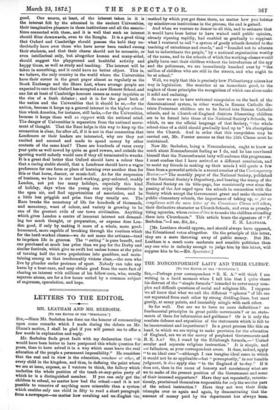LETTERS TO THE EDITOR.
MR. LEATHAM AND MR. SEEBOIIM.
[To THE EDITOR OP THE "SPECTATOR."]
Sin,—Since Mr. Seebohm has done me the honour of commenting upon some remarks which I made during the debate on Mr. Dixon's motion, I shall be glad if you will permit me to offer a few words in explanation and reply.
Mr. Seebohm finds great fault with my declaration that "it would have been better to have postponed this whole question for years, than to have solved it in a way which must leave the real education of the people a permanent impossibility." He considers that the real end in view is the education, somehow or other, of every child in the kingdom, and thus, in defining the point where we are at issue, exposes, as I venture to think, the fallacy which underlies the whole position of the teach-at-any-price party of which he is a distinguished member. If you can only get the children to school, no matter how bad the school—and it is not possible to conceive of anything more miserable than a system which enables only one child in fifty to read a short paragraph from a newspaper—no matter how revolting and un-English the
method by which you get them there, no matter how you bolster up mischievous institutions in the process, the end is gained.
And when we venture to demur to all this, and to estimate that it would have been better to have waited until public opinion, already ripening rapidly, had enabled us gradually to supplant what I ventured to call "a system of goody schools devoted to the teaching of catechisms and creeds," and " founded not to educate but to indoctrinate the people," by a national organization worthy of the name, and to the schools of which the working-classes would gladly have sent their children without the introduction of the spy and the policeman, we are immediately knocked over by "the million of children who are still in the streets, and who ought to be at school."
Well, we reply that this is precisely how Philanthropy misses her way in legislation. She snatches at an immediate good, to the neglect of those principles the recognition of which can alone make it solid and enduring.
So now we are to have universal compulsion on the back of the denominational system, in other words, in Roman Catholic dis- tricts Protestant children are to be forced into Roman Catholic schools, and in Church-of-England districts Dissenting children, are to be forced into those of the National Society's Schools, in- which, to use the official language of that Society, "the whole school-time of a child should gradually lead up to" his absorption- into the Church. And in order that this compulsion may be carried out, Mr. Forster assures us that the 25th Clause must be maintained.
Now Mr. Seebohm, being a Nonconformist, ought to know as much about Nonconformist feeling as I do, and he has convinced himself that the Nonconformist laity will embrace this programme. I must confess that I have arrived at a different conclusion, and to assist my friends in making up their minds I will quote a few lines from a powerful article in a recent number of the Contemporary Review:—" The monthly paper of the National Society, published at the National Society's Depository, and bearing the stamp of the National Society on its title-page, has consistently ever since the passing of the Act urged upon the schools in connection with the Society which accept the Government grant and make themselves public elementary schools, the importance of taking up, so far as- compliance with the mere letter of the Conscience Clause will allow, their distinctive character as Church Schools, and even as prosely- tizing agencies, whose raison d'être is to make the children attending them into Churchmen." This article beam the signature of "F.
[Mr. Leatham should oppose, and should always have opposed, the Educational votes altogether. On the principle of this letter, they are a mere throwing away of public money. But Mr. Leatham is a much more moderate and sensible politician than any one who is unlucky enough to judge him by this letter, will suppose him to be.—En. Spectator.]


































 Previous page
Previous page